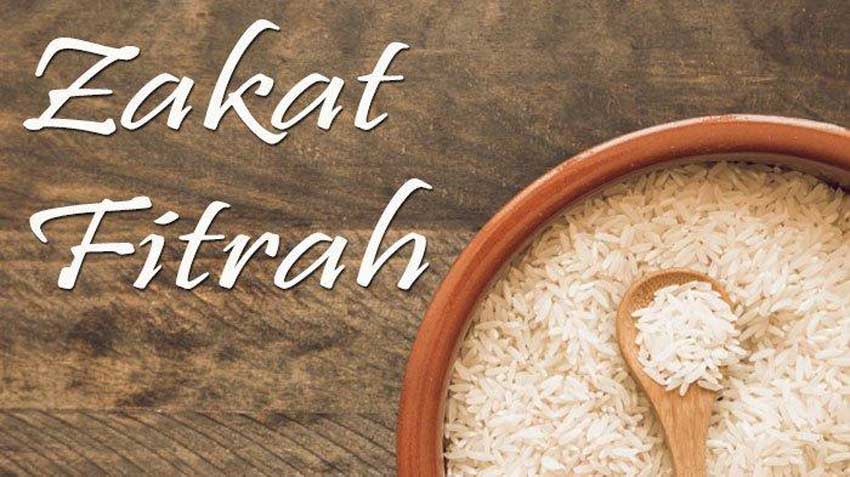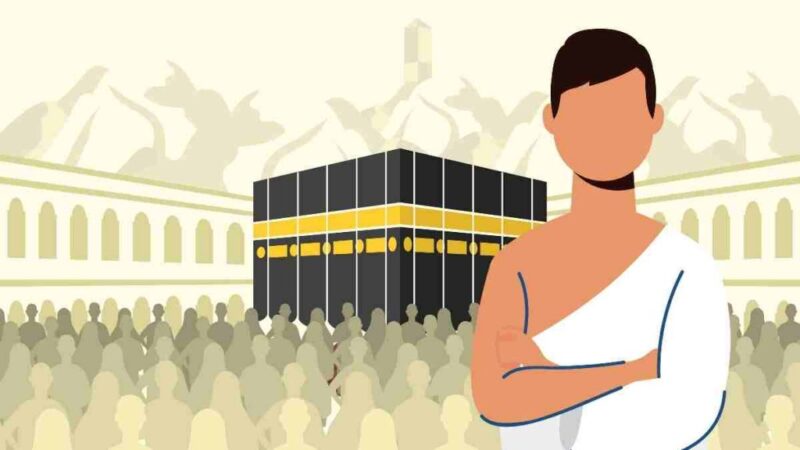Intentions, prayers and procedures for paying zakat fitrah for yourself and your family

[ad_1]
It won’t be long before the Islamic Ummah will greet the holy month of Ramadan again, to be precise in mid-April 2020. Later, at the end of the month of Ramadan, there will be something called the fulfillment of zakat fitrah and you must know the intention of zakat fitrah.
Of course, at the end of Ramadan, there are obligations that must be fulfilled by the Muslim Ummah, which are obligatory upon them based on certain terms or conditions. The obligation in question is to pay zakat fitrah.
So, for those who have forgotten about the intention and prayer of zakat fitrah and also what is actually in Islam related to the procedure for paying zakat fitrah, here is the explanation.
People Burdened To Pay Zakat Fitrah
Zakat fitrah Also known as corporate zakat. Paying Zakat is an obligation for all Muslims who can afford it. What is said to be able to fulfill Zakat Fitrah is if a person has excess food for himself and his family.
A Muslim is required to pay zakat fitrah when he has reached the nisab (minimum standard of calculating wealth) as well as the haul (ie a predetermined time limit) of zakat.
Four madhhab priests agree that zakat fitrah is obligatory for every strong Muslim, whether young or old. So the guardians of young children and crazy people are obliged to spend their wealth and give it to the poor.
Imam Syafi’i himself said that what people say is capable is someone who has more basic food for himself and for his family on the day and night of the holidays. with the exception of the need for shelter, and primary tools.
Amount to be Issued
Nature it is obligatory for a person one sha’ (one bushel) as determined by the Prophet SAW whether it is from wheat or poetry, or dates, or zabib, or rice, or corn or something that is the staple food everyday.
Syekh Yusuf Qardhawi said that the provisions in terms of the measure that must be issued for zakat fitrah did not change because it was limited by the syar’i size, namely one sha’ (one bushel) as determined by the Prophet SAW.
The lesson is as follows: First, for the Arab nation, especially the Bedouins, at that time money had an honorable position. Thus if we ask one of them, “Take out one dirham or one dinar!” They won’t be able to grant it.
In addition, they also did not have anything other than food, such as wine, dates, wheat, and so on, which the Arabs used to eat at that time. This is what prompted the Prophet Muhammad to limit or measure zakat fitrah with a measure of sha’.
Second, currency values, as we all know, change from time to time. Sometimes we find that real currency has a low exchange rate so that the purchase value decreases. However, it is possible that the opposite will occur, the exchange rate will increase so that the buying and selling values will also increase.
So, if this is used as a measure of zakat, the amount will always change every time. That’s why the Prophet SAW gave a standard measure that will not change, namely sha’. One sha’ of food is usually enough to satisfy a family for a day.
Categories of staple food that must be issued as zakat fitrah are not limited to certain types. Even though the Prophet SAW had determined it at his time which was based on the staple food at that time. For this reason, the scholars say that it is permissible to issue zakat fitrah in the form of local staple foods, whether in the form of rice, wheat, corn, or other things.
Procedures for Paying Zakat Fitrah
In the opinion of Imam Syafi’i the time required to issue it is the end of Ramadan and the beginning of Shawwal. This means at the setting of the sun and a little earlier (in the near future) on the last day of the month of Ramadan.
Circumcised issued it at the beginning of the feast. and it is forbidden to take it out after the sun sets on the first day (of Shawwal), unless there is an excuse.
One hadith that supports this is:
“That the Prophet ordered that zakat fitrah be given before Muslims go to perform the Eid al-Fitr prayer (Eid prayer). (Hadith Sahih Muslim 1645)”.
Related to the procedure for paying zakat fitrah, which can be done by paying one sha’, or if specified, namely (1 sha’ = 4 mud, 1 mud = 675 gr).
This calculation, if implemented in a more general form, is roughly equivalent to 3.5 liters or 2.7 kg of staple food (flour, dates, wheat, aqith and rice) or what is commonly consumed in the area concerned (the Shafi’i and Maliki Schools). .
Zakat can also be made in the form of money equivalent to the price of rice, multiplied by the weight of the rice that must be paid.
Intentions and Du’a Zakat Fitrah
In carrying out a mandatory worship, especially paying zakat fitrah, of course there must be an intention that must be said so that all of our worship becomes valid.
As for the prayer readings and the intention to pay Zakat fitrah that you can say for yourself, your wife, children and the whole family, they are as follows.
1. The intention of praying zakat fitrah for yourself is as follows:
ﻧَﻮَﻳْﺖُ أَﻥْ أَﻥْ أُﺧْﺮِﺝَ ﺯَﻛَﺎﺓَ ﺍﻟْﻔِﻄْﺮِ ﻋَﻦْ ﻧَﻔْسيْ ﻓَﺮْ ﺿًﺎ ﻟﻠﻪِ ﺗَﻌَﺎﻟَﻰ
Nawaytu an ukhrija zakaata al-fitri ‘an nafsi fardhan lillahi ta’ala.
Meaning: “I intend to issue zakat fitrah for myself fardhu because of Allah Taala.”
2. The intention of praying zakat fitrah for the wife of a husband is as follows:
ﻧَﻮَﻳْﺖُ ﺃَﻥْ ﺃُﺧْﺮِﺝَ ﺯَﻛَﺎﺓَ ﺍﻟْﻔِﻄْﺮِﻋَﻦْ ﺯَﻭْﺟَﺘِﻲْ ﻓَﺮْﺿًﺎ ﻟﻠﻪِ ﺗَﻌَﺎﻟَﻰ
Nawaytu an ukhrija zakaata al-fitri ‘an zaujati fardhan lillahi ta’ala.
Meaning: “I intend to issue zakat fitrah for my wife fardhu because of Allah Taala.”
3. The intention to pray zakat fitrah for boys if their parents pay for the intention is as follows:
ﻧَﻮَﻳْﺖُ ﺃَﻥْ ﺃُﺧْﺮِﺝَ ﺯَﻛَﺎﺓَ ﺍﻟْﻔِﻄْﺮِ ﻋَﻦْ ﻭَﻟَﺪِﻱْ … ﻓَﺮْﺿًﺎ ﻟﻠﻪِ ﺗَﻌَﺎﻟَﻰ
Nawaytu an ukhrija zakaata al-fitri ‘an waladi… fardhan lillahi ta’ala.
Meaning: “I intend to issue zakat fitrah for my son… (mention the name), fardhu because of Allah Taala.”
4. The intention to pray zakat fitrah for girls if their parents pay for it, the lafadz intention is as follows:
ﻧَﻮَﻳْﺖُ ﺃَﻥْ ﺃُﺧْﺮِﺝَ ﺯَﻛَﺎﺓَ ﺍﻟْﻔِﻄْﺮِﻋَﻦْ ﺑِﻨْﺘِﻲْ … ﻓَﺮْﺿًﺎ ﻟﻠﻪِ ﺗَﻌَﺎﻟَﻰ
Nawaytu an ukhrija zakaata al-fitri ‘an bint… fardhan lillahi ta’ala.
Meaning: “I intend to issue zakat fitrah for my daughter… (mention name), fardhu because of Allah Taala.”
5. The intention to pray zakat fitrah for all family members, the lafadz intention is as follows:
ﻧَﻮَﻳْﺖُ ﺃَﻥْ ﺃُﺧْﺮِﺝَ ﺯَﻛَﺎﺓَ ﺍﻟْﻔِﻄْﺮِ ﻋَنِّيْ ﻭَﻋَﻦْ ﺟَ ﻤِﻴْﻊِ ﻣَﺎ ﻳَﻠْﺰَﻣُنِيْ ﻧَﻔَﻘَﺎﺗُﻬُﻢْ ﺷَﺮْﻋًﺎ ﻓَﺮْﺿًﺎ ﻟﺎ ﻟﻠ ﻪِ ﺗَﻌَﺎﻟَﻰ
Nawaytu an ukhrija zakaata al-fitri ‘anni wa ‘an jami’i ma yalzamunii nafaqaatuhum syar’an fardhan lillahi ta’ala.
Meaning: “I intend to issue zakat fitrah for myself and all people whose living is my fardhu’s responsibility because of Allah Taala.”
6. The intention of the zakat fitrah prayer for all the people we represent, the lafadz of the intention is as follows:
ﻧَﻮَﻳْﺖُ ﺃَﻥْ ﺃُﺧْﺮِﺝَ ﺯَﻛَﺎﺓَ ﺍﻟْﻔِﻄْﺮِ ﻋَﻦْ (..…) ﻓَﺮْﺿًﺎ ﻟﻠﻪِ ﺗَﻌَﺎﻟَﻰ
Nawaytu an ukhrija zakaata al-fitri ‘an (……) fardhan lillahi ta’ala.
Meaning: “I intend to issue zakat fitrah for … (mention the specific name), fardhu because of Allah Taala.”
People who are entitled to receive Zakat Fitrah
The scholars of the madhhab agree that the people who are entitled to receive zakat fitrah are people who are entitled to receive zakat in general, namely the people described in A1-Qur’an surah At-taubah verse 60, as explained above.
Zakat fitrah is circumcised to be given to relatives (family) who are close and who really need it. then neighbors. As explained in the following hadith:
“Neighbors who are entitled to receive zakat are more entitled to receive it”.
This means that neighbors who belong to the recipient group must be prioritized to be given.
For those who receive zakat fitrah, he should read a prayer when receiving zakat fitrah, where the prayer is as follows:
Ajarakallahu fiimaa a’thaita wa baaraka fiimaa abqaita wa ja’ala laka thahuuraan.
Which means: “May Allah repay what you give and bless the wealth that you have left and make it a clean treasure for you”.


